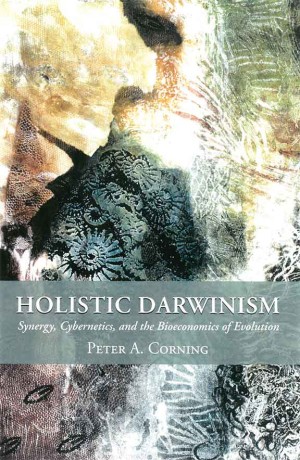© University of Chicago Press, 2005.
ABSTRACT
 In recent years, evolutionary theorists have come to recognize that the reductionists, individualists, gene-centered approach to evolution cannot sufficiently account for the emergence of complex biological systems over time. Peter A. Corning has been at the forefront of a new generation of complexity theorists who have been working to reshape the foundations of evolutionary theory. Well known for his Synergism Hypothesis- a theory of complexity in evolution that assigns a key casual role to various forms of functional synergy – Corning puts this theory into a much broader framework in Holistic Darwinism, addressing many of the issues and concepts associated with the evolution of complex systems. Corning’s paradigm embraces and integrates many related theoretical developments of recent years, from multilevel selection theory to niche construction theory, gene-culture coevolution theory, and theories of self-organization. Offering new approaches to thermodynamics, information theory, and economic analysis, Corning suggests how all of these domains can be brought firmly with in what he characterizes as a post-neo-Darwinism evolutionary synthesis.
In recent years, evolutionary theorists have come to recognize that the reductionists, individualists, gene-centered approach to evolution cannot sufficiently account for the emergence of complex biological systems over time. Peter A. Corning has been at the forefront of a new generation of complexity theorists who have been working to reshape the foundations of evolutionary theory. Well known for his Synergism Hypothesis- a theory of complexity in evolution that assigns a key casual role to various forms of functional synergy – Corning puts this theory into a much broader framework in Holistic Darwinism, addressing many of the issues and concepts associated with the evolution of complex systems. Corning’s paradigm embraces and integrates many related theoretical developments of recent years, from multilevel selection theory to niche construction theory, gene-culture coevolution theory, and theories of self-organization. Offering new approaches to thermodynamics, information theory, and economic analysis, Corning suggests how all of these domains can be brought firmly with in what he characterizes as a post-neo-Darwinism evolutionary synthesis.
IN PRAISE OF HOLISTIC DARWINISM
“An extraordinary tour-de-force … Peter Corning is one of the most imaginative thinkers that I have read. Using his deep comprehension of the behavior of complex systems he not only challenges conventional assessments of evolutionary thinking but generates an entirely new version of evolutionary process that properly integrates the wealth of relationships amongst all living organisms and will replace conventional reductionist opinion.”
– Anthony Trewavas FRS,FRSE,
Institute of Cell and Molecular Biology,
University of Edinburgh“This is an exceptionally ambitious and important book that proposes to change the way most of us have thought about Darwinism and evolutionary processes. Corning achieves this goal in many ways, but most effectively by integrating both his own diverse work in recent years and citation of just about everyone who has played a major role in scholarly dialogue on evolutionary biology and behavior over the last generation. ”
– Roger D. Masters,
Dartmouth College“Corning’s book is a masterpiece of synthesizing the most far-reaching facts and theories of evolutionary biology (and many other fields) and applying them with finesse to a variety of social phenomena. This book is a challenging and path-breaking contribution.”
– John Gowdy,
Rensselaer Polytechnic Institute
TABLE OF CONTENTS
- Introduction: The New Evolutionary Paradigm
- Part I: Synergy and Evolution: From the Origins of Life to Global Governance
1. Synergy: Another Idea Whose Time Has Come?
2. Holistic Darwinism: “Synergistic Selection” and the Evolutionary Process
3. “The Synergism Hypothesis”: On the Concept of Synergy and its Role in the Evolution of Complex Systems
4. Synergy Versus Self-organization in the Evolution of Complex Systems
5. The Re-emergence of “Emergence”: A Venerable Concept in Search of a Theory
6. Synergy, Cybernetics and the Evolution of Politics
7. “Devolution” as an Opportunity to Test the “Synergism Hypothesis” and a Cybernetic Theory of Political Systems
8. Synergy and the Evolution of “Superorganisms”: Past, Present and Future
- Part II: Bioeconomics and Evolution
9. Evolutionary Economics: Metaphor or Unifying Paradigm?
10. Bioeconomics as a Subversive Science
11. Biological Adaptation in Human Societies: A “Basic Needs’ Approach
- Part III: From Thermodynamics and Information Theory to “Thermoeconomics” and “Control Information”
12. To Be Or Entropy: Thermodynamics, Information and Life Revisited
13. “Thermoeconomics”: Beyond the Second Law
14. “Control Information”: The Missing Element in Norbert Wiener’s Cybernetic Paradigm?
- Part IV: Evolution and Ethics
15. Evolutionary Ethics…An Idea Whose Time Has Come?
16. The Sociobiology of Democracy: Is Authoritarianism in Our Genes?
17. “Fair Shares”: A Biological Approach to Social Justice
For more information, please contact Peter Corning
